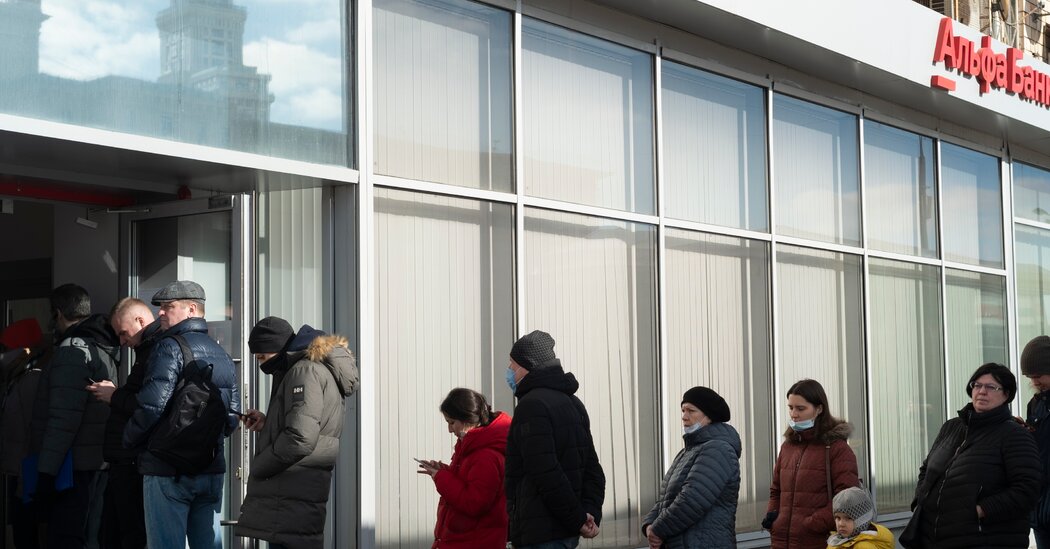In deciding to invade Ukraine, Vladimir Putin clearly misjudged everything. He had an exaggerated view of his own nation’s military might; my description last week of Russia as a Potemkin superpower, with far less strength than meets the eye, looks even truer now. He vastly underrated Ukrainian morale and military prowess, and failed to anticipate the resolve of democratic governments — especially, although not only, the Biden administration, which, in case you haven’t noticed, has done a remarkable job on everything from arming Ukraine to rallying the West around financial sanctions.
I can’t add anything to the discussion of the war itself, although I will note that much of the commentary I’ve been reading says that Russian forces are regrouping and will resume large-scale advances in a day or two — and has been saying that, day after day, for more than a week.
What I think I can add, however, is some analysis of the effects of sanctions, and in particular an answer to one question I keep being asked: Can China, by offering itself as an alternative trading partner, bail out Putin’s economy?
No, it can’t.
Let’s talk first about the impact of those sanctions.
One thing the West conspicuously hasn’t done is try to block Russian sales of oil and gas — the country’s principal exports. Oh, the United States might ban imports of Russian oil, but this would be a symbolic gesture: Oil is traded on a global market, so this would just reshuffle trade a bit, and in any case U.S. imports from Russia account for only about 5 percent of Russian production.
The West has, however, largely cut off Russia’s access to the world banking system, which is a very big deal. Russian exporters may be able to get their stuff out of the country, but it’s now hard for them to get paid. Probably even more important, it’s hard for Russia to pay for imports — sorry, but you can’t carry out modern international trade with briefcases full of $100 bills. In fact, even Russian trade that remains legally permitted seems to be drying up as Western companies that fear further restrictions and a political backlash engage in “self-sanctioning.”
How much does this matter? The Russian elite can live without Prada handbags, but Western pharmaceuticals are another matter. In any case, consumer goods are only about a third of Russia’s imports. The rest are capital goods, intermediate goods — that is, components used in the production of other goods — and raw materials. These are things Russia needs to keep its economy running, and their absence may cause important sectors to grind to a halt. There are already suggestions, for example, that the cutoff of spare parts and servicing may quickly cripple Russia’s domestic aviation, a big problem in such a huge country.
But can China provide Putin with an economic lifeline? I’d say no, for four reasons.
First, China, despite being an economic powerhouse, isn’t in a position to supply some things Russia needs, like spare parts for Western-made airplanes and high-end semiconductor chips.
Second, while China itself isn’t joining in the sanctions, it is deeply integrated into the world economy. This means that Chinese banks and other businesses, like Western corporations, may engage in self-sanctioning — that is, they’ll be reluctant to deal with Russia for fear of a backlash from consumers and regulators in more important markets.
Third, China and Russia are very far apart geographically. Yes, they share a border. But most of Russia’s economy is west of the Urals, while most of China’s is near its east coast. Beijing is 3,500 miles from Moscow, and the only practical way to move stuff across that vast expanse is via a handful of train lines that are already overstressed.
Finally, a point I don’t think gets enough emphasis is the extreme difference in economic power between Russia and China.
Some politicians are warning about a possible “arc of autocracy” reminiscent of the World War II Axis — and given the atrocities underway, that’s not an outlandish comparison. But the partners in any such arc would be wildly unequal.
Putin may dream of restoring Soviet-era greatness, but China’s economy, which was roughly the same size as Russia’s 30 years ago, is now 10 times as large. For comparison, Germany’s gross domestic product was only two and a half times Italy’s when the original Axis was formed.
So if you try to imagine the creation of some neofascist alliance — and again, that no longer sounds like extreme language — it would be one in which Russia would be very much the junior partner, indeed very nearly a Chinese client state. Presumably that’s not what Putin, with his imperial dreams, has in mind.
China, then, can’t insulate Russia from the consequences of the Ukraine invasion. It’s true that the economic squeeze on Russia would be even tighter if China joined the democratic world in punishing aggression. But that squeeze is looking very severe even without Chinese participation. Russia is going to pay a very high price, in money as well as blood, for Putin’s megalomania.
The Times is committed to publishing a diversity of letters to the editor. We’d like to hear what you think about this or any of our articles. Here are some tips. And here’s our email: letters@nytimes.com.
Follow The New York Times Opinion section on Facebook, Twitter (@NYTopinion) and Instagram.


























